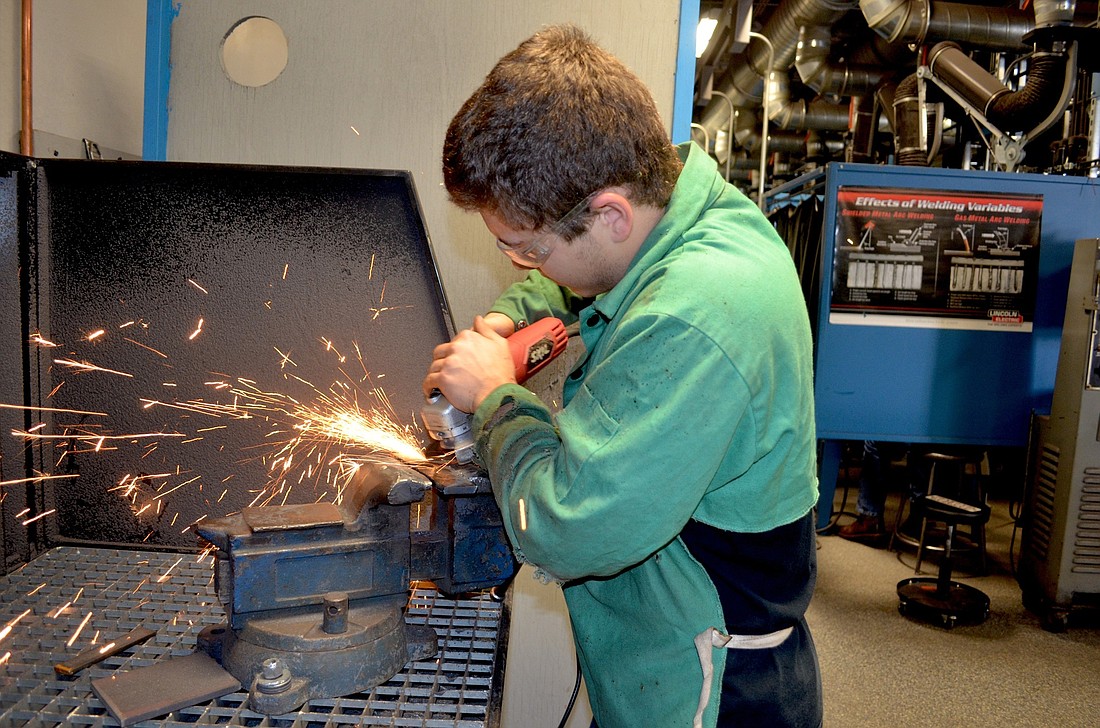- May 20, 2025
-
-
Loading

Loading

Hunched over a burning piece of metal, 17-year-old Devon Hess shaped the material with the precision of a surgeon.
He was attempting to master an overhead open root weld, a bonding of two metal plates. The strength of his weld would be put through a bend test later.
One twitch of the wrist and his measurements of the plates, which needed to be 1/16 of an inch apart, would be off.
Three days a week, the Braden River High senior spends his mornings and part of the afternoon in a welding workshop at Manatee Technical College, which is located in front of Braden River High.
His high school doesn’t offer a course that focuses on welding or extensive metal work, so Hess started taking dual-enrollment courses in August. Traditional metal shop classes, which focused more heavily on machine work than today’s engineering courses, are rare.
Countywide high school students like Hess, who have an interest in carpentry, machining and other vocational training that they can't receive at their high schools, are dual enrolling at Manatee Technical College. The school is filling that void with a focus on metal and woodwork and machines used to cut those materials.
“This is a great opportunity for high schoolers,” Hess said. “I’m planning to get a job as a welder and maybe open my own shop somewhere local.”
MTC cooperates with local high schools to offer certain dual enrollment courses for students.
Doug Wagner, the director of adult career and technical education for the Manatee County School District, said the proximity of Lakewood Ranch and Braden River high schools to MTC campuses has intrigued students to learn more about MTC.
“We have collaborative dual enrollment with all high schools,” Wagner said. “You could argue that’s because Lakewood Ranch has an MTC campus on their campus as well. We have a lot of people who walk over there for firefighter classes.”
Braden River High technology teacher Gil Burlew said he encourages students who are interested in learning a trade, such as welding, to attend the neighboring school.
“There’s definitely a cohesiveness between the two schools,” Burlew said. “I take my kids over there sometimes on a daily basis to show them the programs. MTC is giving them skills they're going to need for workplace readiness.”
Dual enrollment at MTC dates back more than 30 years.
The state pays for high schoolers to take dual enrollment classes, which saves students more than $5,000 each, Wagner said.
Students only pay for their identification badges and school uniforms.
"There's a huge need for dual enrollment," Wagner said. "It's a great opportunity for high school students to graduate with industry certifications. They can step right out of high school and into a great career."
Wagner said since schools introduced new class schedules over the last few years, the dual enrollment option has become more appealing to students.
Hess attends MTC on days that he has elective courses. His school runs on an “even and odd schedule,” which means students attend class periods 2,4 and 6 one day and 1,3,5 and 7 the following day.
The schedule allows for him to attend and maintain his schedule of core subjects, such as math, while using his odd period days to attend MTC.
“Dual enrolling here is where students get their elective credits,” Wagner said. “Students who want focused electives take them with us. Schools that run on the seven-period schedule, where students take the same seven classes every day, aren’t able to participate in dual enrollment.”
Of the 67 school districts in Florida, 29 have technical colleges.
Parents, such as Christine Walker, who has a child at Braden River High, hope the county will consider building a technical high school to meet the demand of packed East County schools, such as Braden River High.
The school board hasn’t discussed plans for a technical high school. In fact, the board closed the county’s only technical high school, Y-Technical High School, in 2014.
Educators believe MTC’s class offerings give students who aren’t interested in attending a four-year university an option that will equip them for the workforce.
“Not every child wants to go to a university, and that’s OK,” said Cynthia Saunders, deputy superintendent for instructional services. “For a number of students, vocational classes keep them interested in school and give them a focus on a possible job in their future.”
That doesn’t mean every student who attends MTC isn’t college bound.
“I don’t believe the choice has to be vocational school or college,” Wagner said. “The majority of our classes are articulated to State College of Florida. High school students dual enrolled in the Automotive Service Program can earn 19 credit hours, which go toward a two- or four-year degree at SCF.”
The stigma that vocational classes are just for troubled teenagers who can’t attend regular high schools is also overblown. Wagner said attending a technical school today means a student is motivated and preparing for the workforce.
“MTC isn’t for dropouts,” Wagner said. “It’s nothing like that. Our students are focused. The world is so technical and advanced, the technical skills our students need to achieve success are higher than they've ever been."